| | | | | | | Presented By OurCrowd | | | | Axios World | | By Dave Lawler ·Jun 03, 2021 | | Welcome back to Axios World. - Tonight's edition (1,815 words, 6½ minutes) focuses mainly on vaccines, with an update as well on the potential political transition in Israel.
- Heads-up: The full itinerary for Biden's first foreign trip is out. He'll see the G7, NATO, Queen Elizabeth II, Boris Johnson, Recep Tayyip Erdoğan and Vladimir Putin (starts June 10).
New arrival? Sign up | | | | | | 1 big thing: 2 billion doses |  Data: Our World in Data; Chart: Danielle Alberti/Axios The world reached a vaccination milestone this week, with 2 billion total doses now administered, according to the tracker from Our World in Data. Why it matters: The global rate is speeding up considerably. It took 30 days to go from 500 million doses to 1 billion, 24 days to go from 1 billion to 1.5 billion, and just 16 days to jump from 1.5 billion to 2 billion. - But the vast majority of those vaccinations are still coming in the countries or regions that are either producing vaccines at scale (China, India, U.S., EU) or could afford to buy their way to the front of the line.
Breaking it down: High-income countries (as defined by the World Bank) are generally far ahead of the pack, with a combined 16% of the world's population but 38% of all vaccinations. - But even among the wealthy, progress is uneven. 58% of Brits have had at least one dose, for example, versus just 13% of South Koreans and 9% in Japan.
- Meanwhile, low-income countries are nearly all struggling, with 9% of the world's population but 0.3% of vaccinations. Sub-Saharan Africa is the furthest behind (see chart).
That gulf in supply has been exacerbated by the fact that the COVAX initiative — on which many low- and middle-income countries are relying — is running months behind schedule. - Efforts to expand manufacturing capacity, particularly in the developing world, could help close the gap over time. But for now, attention is falling on the rich countries that have purchased far more than they need.
- President Biden will likely leverage the White House announcement today on dose sharing (see item 2) to lobby other rich countries to increase their pledges, including at the upcoming G7 summit.
- The EU, for example, has promised to donate 100 million doses by the end of the year, but has offered little in the short term.
What to watch: Some low-income countries like the Democratic Republic of the Congo — which recently returned 1.3 million doses that were at risk of expiring — have struggled to administer the few doses they have obtained. - The challenges include training and deploying health workers, transporting vaccines where they're needed — door to door if necessary — and communicating effectively about the benefits of vaccination.
- As access to vaccines finally starts to increase in the developing world, more global attention and resources will have to be committed to the delivery phase. The World Bank has started funding some of those efforts.
Worth noting: China has nearly tripled its daily vaccination rate over the past month, according to Our World in Data, and it's now giving more shots per day (19.7 million) than all but 14 other countries have over the entirety of the pandemic. |     | | | | | | 2. What to know about Biden's plan to share doses |  Note: This map represents the total number of vaccines administered, not people vaccinated; Data: Our World in Data; Map: Danielle Alberti/Axios After promising a framework on dose sharing for months, and receiving pleas from all over the world, the Biden administration today announced the destinations for its first wave of donations. Breaking it down: The first 25 million doses will be Pfizer, Moderna and J&J, as the 60 million AstraZeneca doses Biden has promised still haven't been cleared by the FDA. - 75% of those 25 million doses will be donated through COVAX, which distributes doses globally based on population. But national security adviser Jake Sullivan said the U.S. would control which COVAX-eligible countries it sent doses to.
- In the first wave, 6 million of those will go to Latin America, 7 million to South and Southeast Asia, and 5 million to Africa, to be distributed at the discretion of the African Union.
- The other 25% will go toward "regional priorities and partner recipients," ranging from Mexico and Canada to the Palestinians to India to Ukraine. The first shipment will depart the U.S. tonight, for South Korea.
What they're saying: "The president has committed to sharing doses on an ongoing basis, starting with 80 million by the end of June. We will continue to donate from our excess supply as that supply is delivered to us," Sullivan said. - Jeff Zients, the White House COVID coordinator, said the 80 million doses were five times what any other country had pledged to donate and 13% of all U.S. production thus far.
- But Sullivan acknowledged that they were insufficient to "reduce the lifespan of the pandemic," and thus manufacturing would have to be bolstered at home and around the world.
What's next: In addition to the donations, producers like Pfizer and Moderna will be able to export U.S.-made doses once they've fulfilled their U.S. contracts. But many of those would be expected to go to rich countries with existing contracts. - Biden could exercise additional purchase options — including 300 million doses each from Pfizer and Moderna — to allow the government to choose the vaccines' destinations while also hedging against the need for boosters.
|     | | | | | | 3. Latin America: The Copa must go on |  Data: Our World in Data; Chart: Sara Wise/Axios Brazil has stepped in to host this month's Copa América, but the issues that caused the former hosts to drop out are roughly as bad in Brazil, Axios' Jeff Tracy and I write. The backdrop: The soccer tournament — originally set for last summer in Colombia and Argentina — was delayed a year by the pandemic. It's now scheduled to begin on June 13. - Colombia lost hosting privileges on May 20 amid mounting civil unrest, which stemmed from an April tax reform proposal.
- Argentina followed suit on May 31 after its record-setting COVID spike led to the suspension of its domestic soccer season.
The state of play: Brazil, which hosted and won the 2019 Copa América, swooped in to save the tournament, which is second in prestige only to the World Cup for the soccer-mad countries involved. - Yes, but: Brazil is facing its own COVID nightmare plus widespread protests against President Jair Bolsonaro's handling of the pandemic.
- In other words, Colombia's civil unrest and Argentina's COVID surge have been replaced by Brazil — which is suffering from both.
The bottom line: Japan isn't the only country set to host an international sporting event this summer with COVID still raging among a mostly unvaccinated population. |     | | | | | | A message from OurCrowd | | Onshore autonomous-manufacturing that can save businesses millions | | |  | | | | Launchpad empowers the $55-billion small-line manufacturing industry to rapidly create complex products close to home, using autonomous manufacturing that intelligently optimizes production using diverse materials. And you can get in early. Explore OurCrowd's Launchpad opportunity. | | | | | | Bonus: Where in the World? | 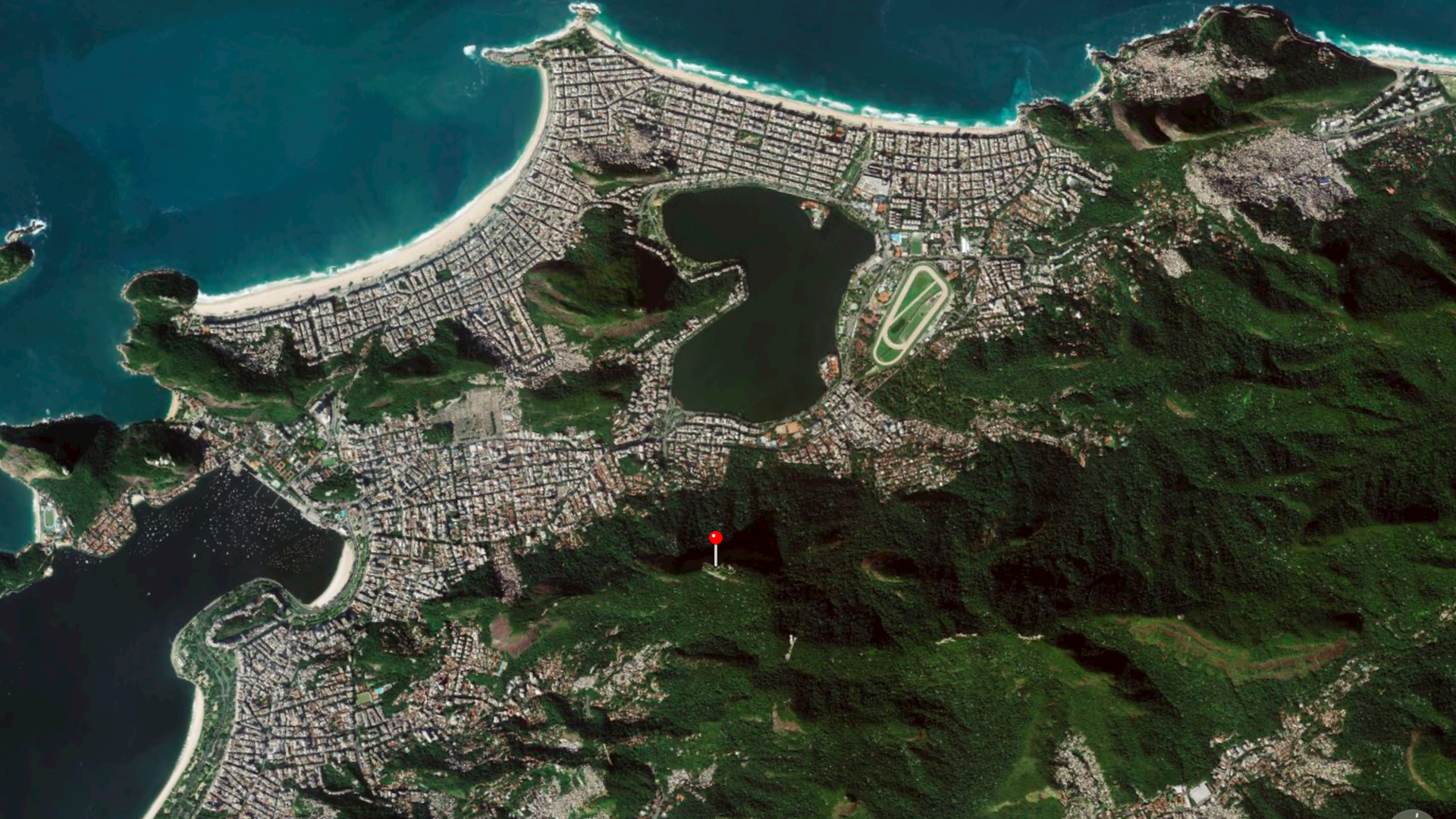 | | | Screengrab via Apple maps | | | | Today's forecast: 82° and sunny. A nice day to be tall and tan and young and lovely. Can you name the much-visited city and take a guess at what the pin is marking? Scroll to the bottom for the answer. |     | | | | | | 4. Eastern Europe falls behind on vaccinations |  Reproduced from Our World in Data; Chart: Axios Visuals While most countries in the EU have raced ahead after a slow initial vaccine rollout, countries in Eastern Europe are far behind, with little prospect of catching up quickly, Axios fellow Teodora Trifonova writes. The state of play: While 39% of people across the EU have had at least one dose, just 12% have in Bulgaria, the lowest rate among the 27 member states. The situation is even more difficult for non-EU members that don't have access to the bloc's bulk vaccine purchases. Bulgaria, the EU's poorest member, declined to order its full share of Pfizer-BioNTech jabs under the EU's procurement scheme, relying mainly on AstraZeneca shots that are cheaper and easier to store. - But Bulgaria suspended the AstraZeneca rollout in March, before resuming it with added restrictions.
- Vaccine hesitancy is also a major problem. Just 18% of Bulgarians wanted to be vaccinated right away according to a February Eurobarometer poll, while 64% thought the vaccines had been approved too quickly to ensure their safety.
The big picture: Bulgaria is actually far ahead of non-EU neighbors like North Macedonia, where just 4.5% of the population has received a first shot, mostly from supplies shared by Serbia and Russia. Between the lines: Geopolitical factors have made a big difference for some countries in Eastern Europe. - Serbia was far ahead of even most EU countries on vaccinations for months, with supplies mainly coming from China and Russia, with which Serbia has friendly relations.
- Ukraine, on the other hand, ruled out approval of the Sputnik V vaccine, seeing Russia's "vaccine diplomacy" as an unwelcome power play.
|     | | | | | | 5. Netanyahu tries to sabotage "change government" | 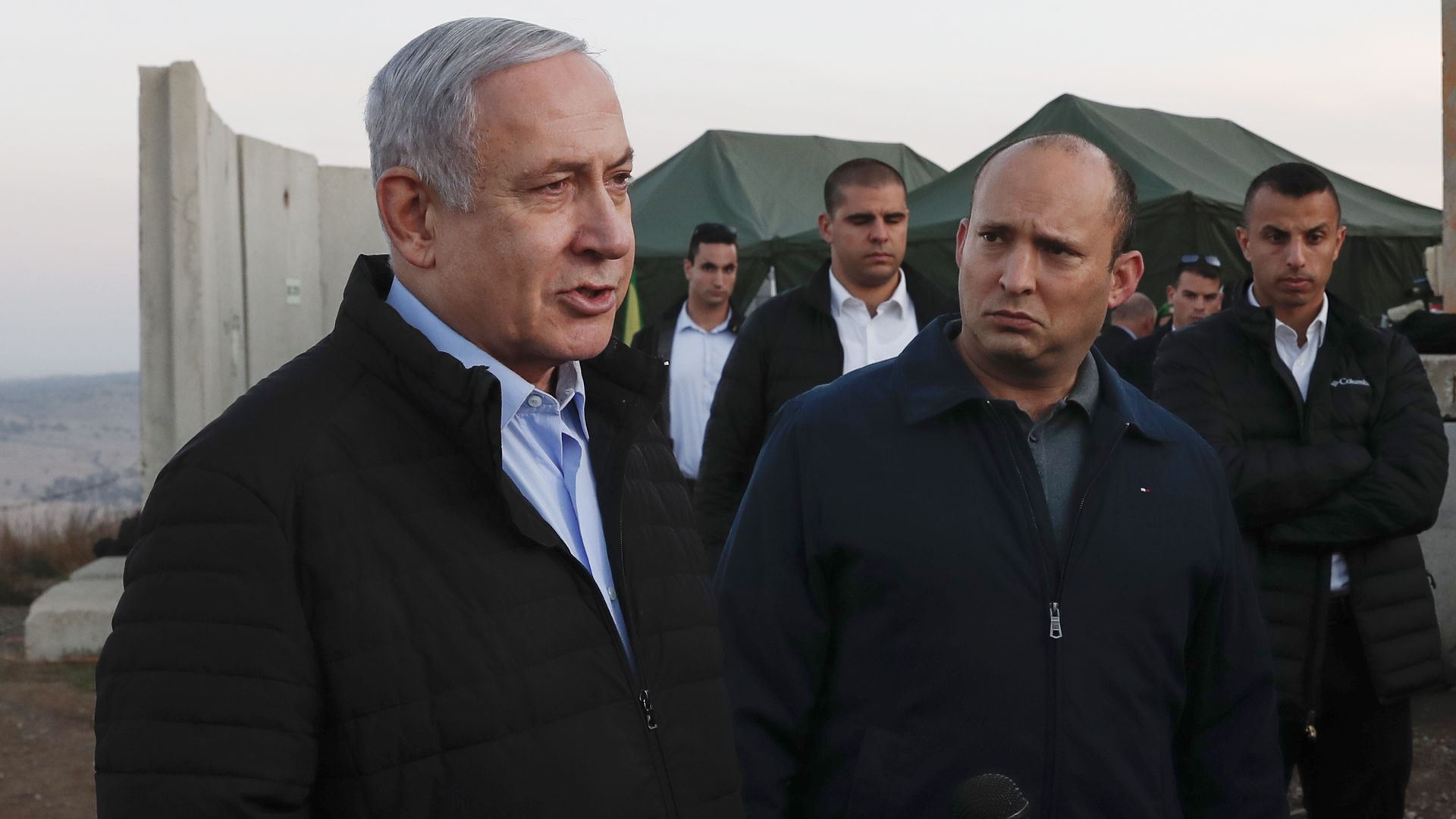 | | | Netanyahu (L) with Bennett in 2019. Photo: Atef Safadi/Pool/AFP via Getty | | | | A right-winger, a centrist and an Islamist finalized a pact yesterday to form Israel's next government. Now, Prime Minister Benjamin Netanyahu has about a week to try to sabotage it. Behind the scenes: Netanyahu asked political allies in a meeting today to push the talking point that Prime Minister-designate Naftali Bennett would be unable to stand up to President Biden on Iran or fend off U.S. pressure on the Palestinian issue, sources who attended the meeting tell Axios' Barak Ravid. - Netanyahu is trying to exert as much pressure as possible on members of Bennett's right-wing Yamina party to refuse to vote for the new government. Even one defection would put the "change government" at risk of failing to obtain the required parliamentary majority.
The state of play: The government-in-waiting includes eight parties united by little other than a desire to remove Netanyahu. - It was made possible by the unprecedented decision of the Islamist Ra'am party — which would be the first Arab party to enter an Israeli government — to unite with Bennett and Yair Lapid, the centrist opposition leader.
The big picture: Bennett, a tech entrepreneur and former Netanyahu protege, would become prime minister despite only winning seven seats in the election. - He was able to play the kingmaker role in the scramble to form a government, with both Netanyahu and Lapid needing his support.
- While he is a conservative, particularly on Israel-Palestine issues, he would be constrained by the broad range of parties in the coalition and the fact that Lapid will have a veto on his policies.
What to watch: If the government does come together, it will likely be highly fragile. Netanyahu would be expected to become opposition leader. |     | | | | | | 6. What I'm reading: Congo's cobalt rush | 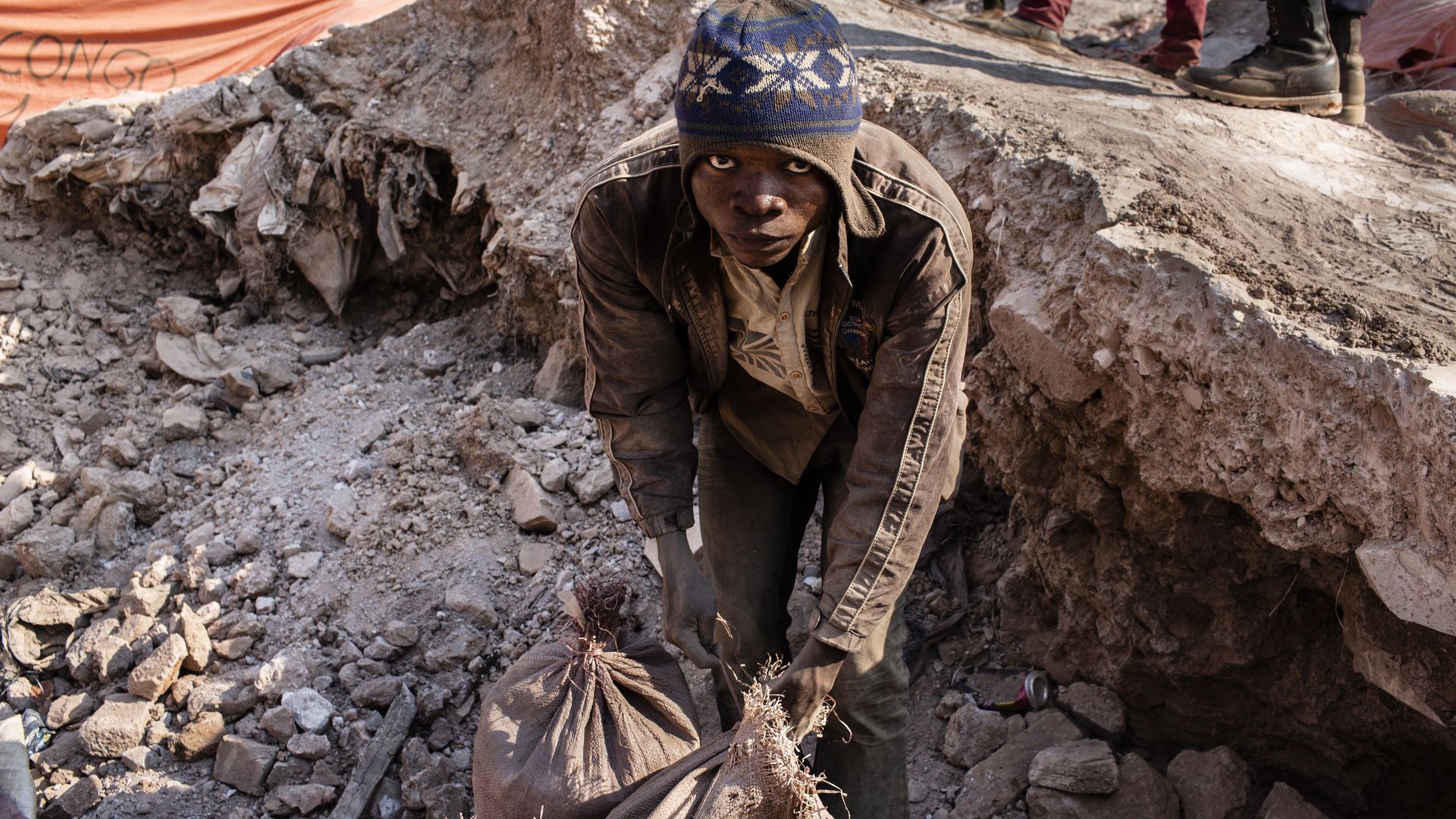 | | | At work at a Chinese-owned cobalt mine. Photo: Sebastian Meyer/Corbis News via Getty | | | | Most of the cobalt used to produce lithium-ion batteries for cellphones and electric cars purchased in the West comes from the Democratic Republic of the Congo As Nicolas Niarchos writes in the New Yorker, people are risking their lives to mine it, some of them children. As the price of cobalt has climbed, remote areas in southern Congo have filled with people hoping to cash in. - Those include Congolese villagers, but also Chinese corporations that have cut deals with corrupt officials, forced people off their lands and operated so ruthlessly that Niarchos compares the situation to Congo's dark period as a Belgian colony.
- Others mine informally, in some cases digging up their own yards, towns and roads in search of cobalt. Such is the poverty in rural Congo, Niarchos writes, that few risks aren't worth taking in this modern-day gold rush.
- The piece includes this searing line: "Children who work in the mines are often drugged, in order to suppress hunger."
What to watch: Companies like Apple and Tesla that use lithium-ion batteries have promised for years to clean up their supply chains, Niarchos says, but there's little sign that practices in the mines are changing. |     | | | | | | 7. Stories we're watching | 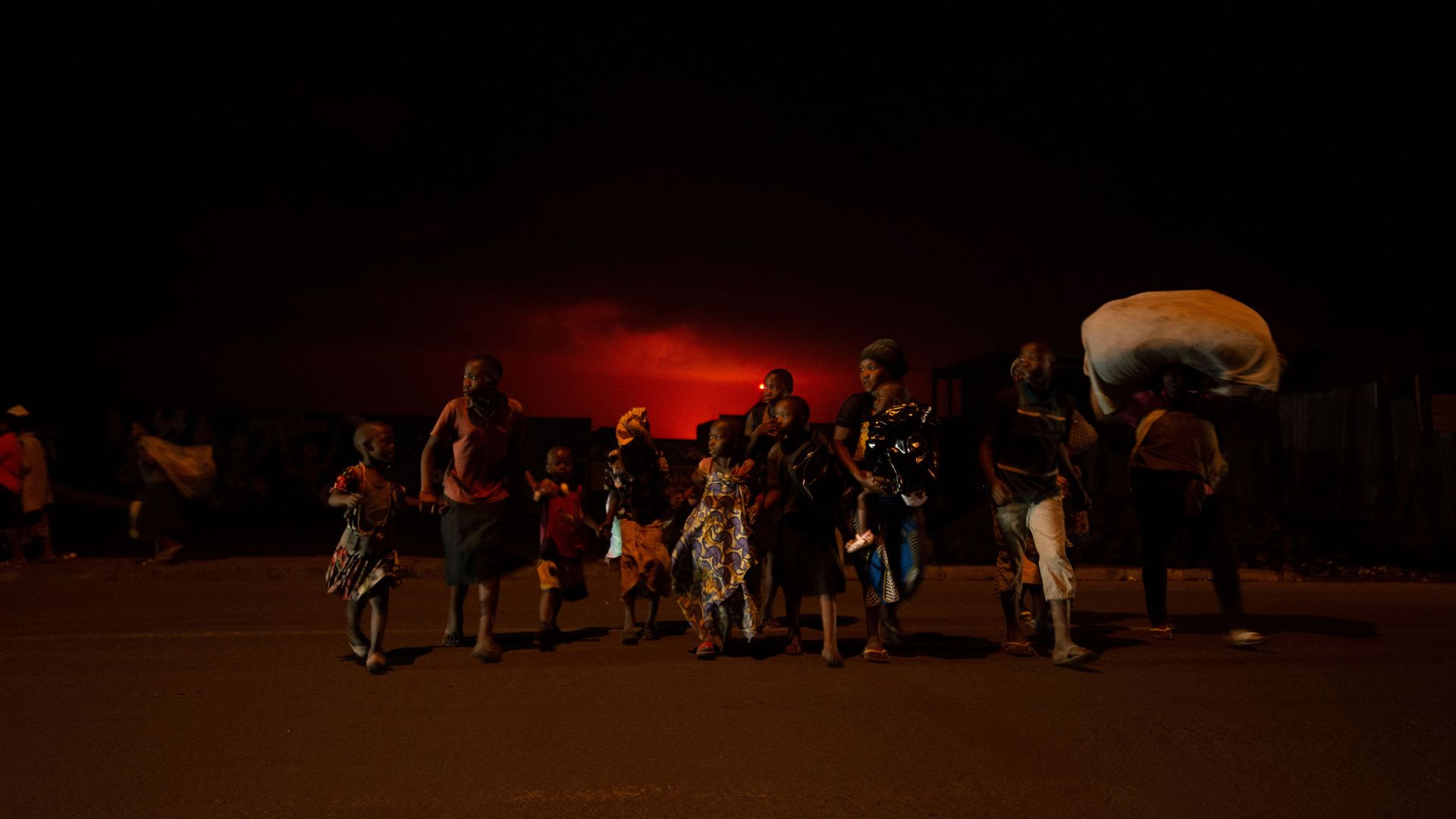 | | | Displaced by a volcano in Goma, DRC. Photo: Guerchom Ndebo/AFP via Getty | | | - Biden ends "Remain in Mexico" policy
- Iran's largest warship sinks after catching fire
- Pandemic roundup: Sinovac shot approved; Death tolls jump in Peru and Mexico; new bird flu
- U.S. announces, then suspends tariffs on allies
- Little progress in Vienna talks as Iran's election approaches
- Israel to ask U.S. for $1 billion in emergency military aid
- Jailed American asks Biden to raise case in Putin summit
Quoted: "The United States is not asking anything of any country to whom we're giving doses. We're not seeking to extract concessions, we're not extorting, we're not imposing conditions in the way that other countries that are providing doses are doing." — Jake Sullivan |     | | | | | | A message from OurCrowd | | Meet the VCs that invested in Lemonade and Beyond Meat before the IPOs | | | 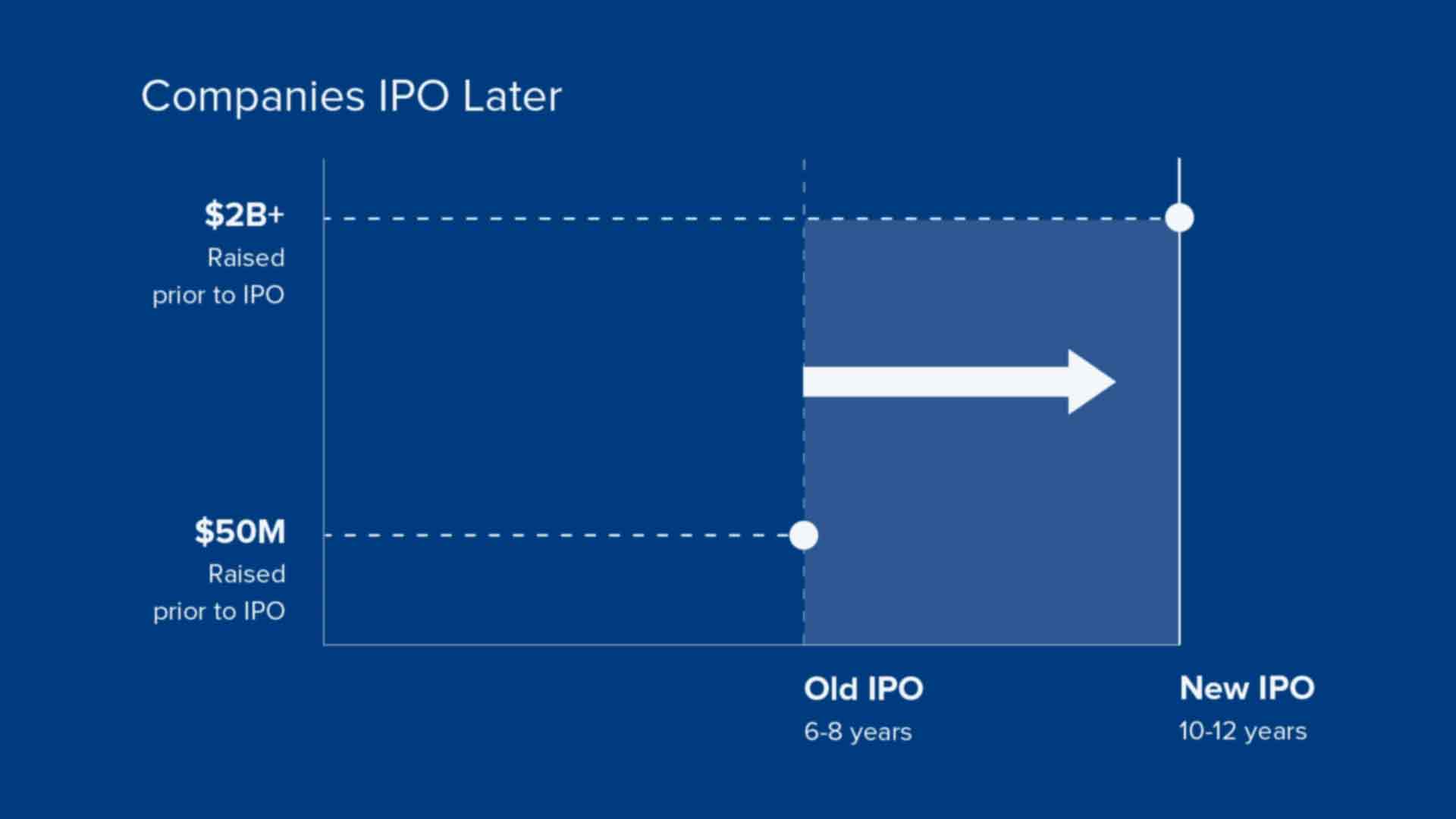 | | | | Global network of 73K+ members and 1000+ MNCs (from Honda to P&G and Travelers to Pepsico), OurCrowd accelerates startups' success. Typical rounds are $2-$20M, with opportunity for more alongside institutional investors. Take the next step to global success - with OurCrowd. | | | | Answer: Rio de Janeiro, with the pin marking Christ the Redeemer. Did you catch the lyrics from "Girl from Ipanema"? |  | | The tool and templates you need for more engaging team updates. | | | | | | Axios thanks our partners for supporting our newsletters. If you're interested in advertising, learn more here.
Sponsorship has no influence on editorial content. Axios, 3100 Clarendon Blvd, Suite 1300, Arlington VA 22201 | | | You received this email because you signed up for newsletters from Axios.
Change your preferences or unsubscribe here. | | | Was this email forwarded to you?
Sign up now to get Axios in your inbox. | | | | Follow Axios on social media:    | | | | | |
No comments:
Post a Comment